HSBC Global Strategy: Analysis of Overseas Trading and Expansion
VerifiedAdded on 2023/06/16
|16
|4419
|330
Report
AI Summary
This report provides an analysis of HSBC's potential global expansion, focusing on Europe as a strategic location. It examines the global business environment, including cultural and economic factors, and evaluates the rationale for international expansion, such as increased revenue potential and access to new markets. The report identifies opportunities like increasing demand for financial services and challenges such as Brexit and public relations. It also discusses relevant trading blocs and agreements, including the European Union and the EU-UK Trade and Cooperation Agreement, offering a critical evaluation of their impact. The conclusion summarizes the key findings and strategic considerations for HSBC's global growth.
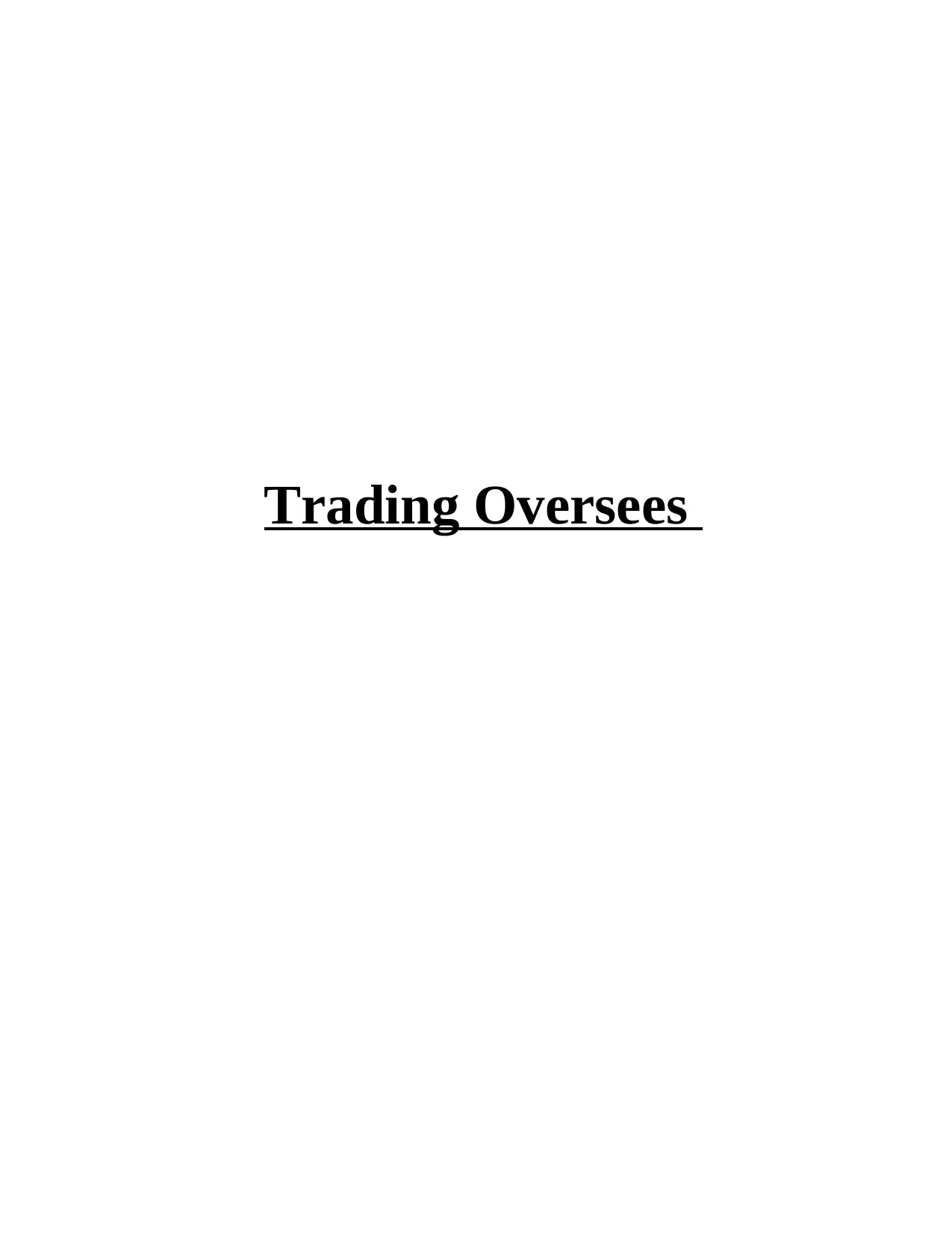
Trading Oversees
Paraphrase This Document
Need a fresh take? Get an instant paraphrase of this document with our AI Paraphraser
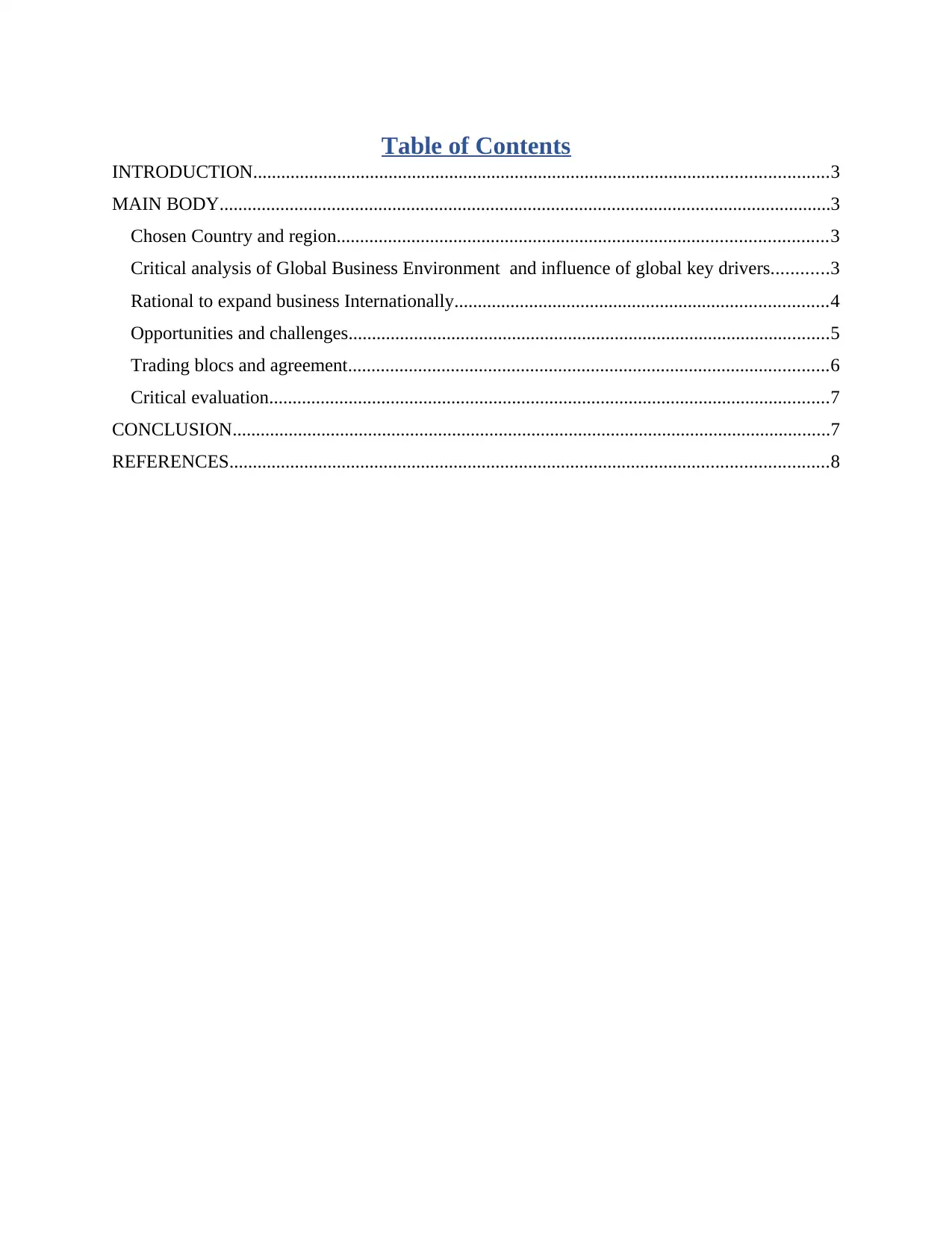
Table of Contents
INTRODUCTION...........................................................................................................................3
MAIN BODY...................................................................................................................................3
Chosen Country and region.........................................................................................................3
Critical analysis of Global Business Environment and influence of global key drivers............3
Rational to expand business Internationally................................................................................4
Opportunities and challenges.......................................................................................................5
Trading blocs and agreement.......................................................................................................6
Critical evaluation........................................................................................................................7
CONCLUSION................................................................................................................................7
REFERENCES................................................................................................................................8
INTRODUCTION...........................................................................................................................3
MAIN BODY...................................................................................................................................3
Chosen Country and region.........................................................................................................3
Critical analysis of Global Business Environment and influence of global key drivers............3
Rational to expand business Internationally................................................................................4
Opportunities and challenges.......................................................................................................5
Trading blocs and agreement.......................................................................................................6
Critical evaluation........................................................................................................................7
CONCLUSION................................................................................................................................7
REFERENCES................................................................................................................................8
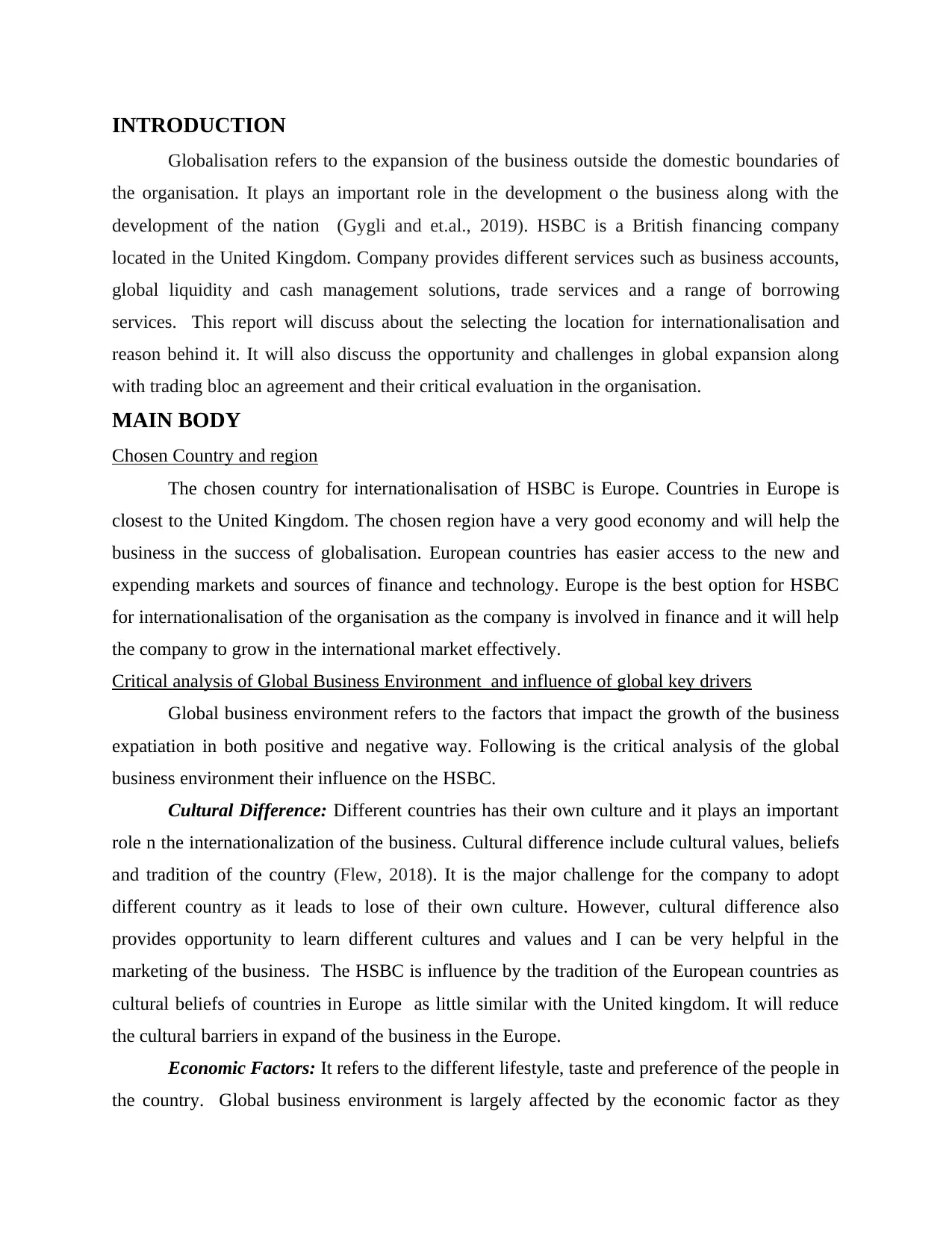
INTRODUCTION
Globalisation refers to the expansion of the business outside the domestic boundaries of
the organisation. It plays an important role in the development o the business along with the
development of the nation (Gygli and et.al., 2019). HSBC is a British financing company
located in the United Kingdom. Company provides different services such as business accounts,
global liquidity and cash management solutions, trade services and a range of borrowing
services. This report will discuss about the selecting the location for internationalisation and
reason behind it. It will also discuss the opportunity and challenges in global expansion along
with trading bloc an agreement and their critical evaluation in the organisation.
MAIN BODY
Chosen Country and region
The chosen country for internationalisation of HSBC is Europe. Countries in Europe is
closest to the United Kingdom. The chosen region have a very good economy and will help the
business in the success of globalisation. European countries has easier access to the new and
expending markets and sources of finance and technology. Europe is the best option for HSBC
for internationalisation of the organisation as the company is involved in finance and it will help
the company to grow in the international market effectively.
Critical analysis of Global Business Environment and influence of global key drivers
Global business environment refers to the factors that impact the growth of the business
expatiation in both positive and negative way. Following is the critical analysis of the global
business environment their influence on the HSBC.
Cultural Difference: Different countries has their own culture and it plays an important
role n the internationalization of the business. Cultural difference include cultural values, beliefs
and tradition of the country (Flew, 2018). It is the major challenge for the company to adopt
different country as it leads to lose of their own culture. However, cultural difference also
provides opportunity to learn different cultures and values and I can be very helpful in the
marketing of the business. The HSBC is influence by the tradition of the European countries as
cultural beliefs of countries in Europe as little similar with the United kingdom. It will reduce
the cultural barriers in expand of the business in the Europe.
Economic Factors: It refers to the different lifestyle, taste and preference of the people in
the country. Global business environment is largely affected by the economic factor as they
Globalisation refers to the expansion of the business outside the domestic boundaries of
the organisation. It plays an important role in the development o the business along with the
development of the nation (Gygli and et.al., 2019). HSBC is a British financing company
located in the United Kingdom. Company provides different services such as business accounts,
global liquidity and cash management solutions, trade services and a range of borrowing
services. This report will discuss about the selecting the location for internationalisation and
reason behind it. It will also discuss the opportunity and challenges in global expansion along
with trading bloc an agreement and their critical evaluation in the organisation.
MAIN BODY
Chosen Country and region
The chosen country for internationalisation of HSBC is Europe. Countries in Europe is
closest to the United Kingdom. The chosen region have a very good economy and will help the
business in the success of globalisation. European countries has easier access to the new and
expending markets and sources of finance and technology. Europe is the best option for HSBC
for internationalisation of the organisation as the company is involved in finance and it will help
the company to grow in the international market effectively.
Critical analysis of Global Business Environment and influence of global key drivers
Global business environment refers to the factors that impact the growth of the business
expatiation in both positive and negative way. Following is the critical analysis of the global
business environment their influence on the HSBC.
Cultural Difference: Different countries has their own culture and it plays an important
role n the internationalization of the business. Cultural difference include cultural values, beliefs
and tradition of the country (Flew, 2018). It is the major challenge for the company to adopt
different country as it leads to lose of their own culture. However, cultural difference also
provides opportunity to learn different cultures and values and I can be very helpful in the
marketing of the business. The HSBC is influence by the tradition of the European countries as
cultural beliefs of countries in Europe as little similar with the United kingdom. It will reduce
the cultural barriers in expand of the business in the Europe.
Economic Factors: It refers to the different lifestyle, taste and preference of the people in
the country. Global business environment is largely affected by the economic factor as they
⊘ This is a preview!⊘
Do you want full access?
Subscribe today to unlock all pages.

Trusted by 1+ million students worldwide
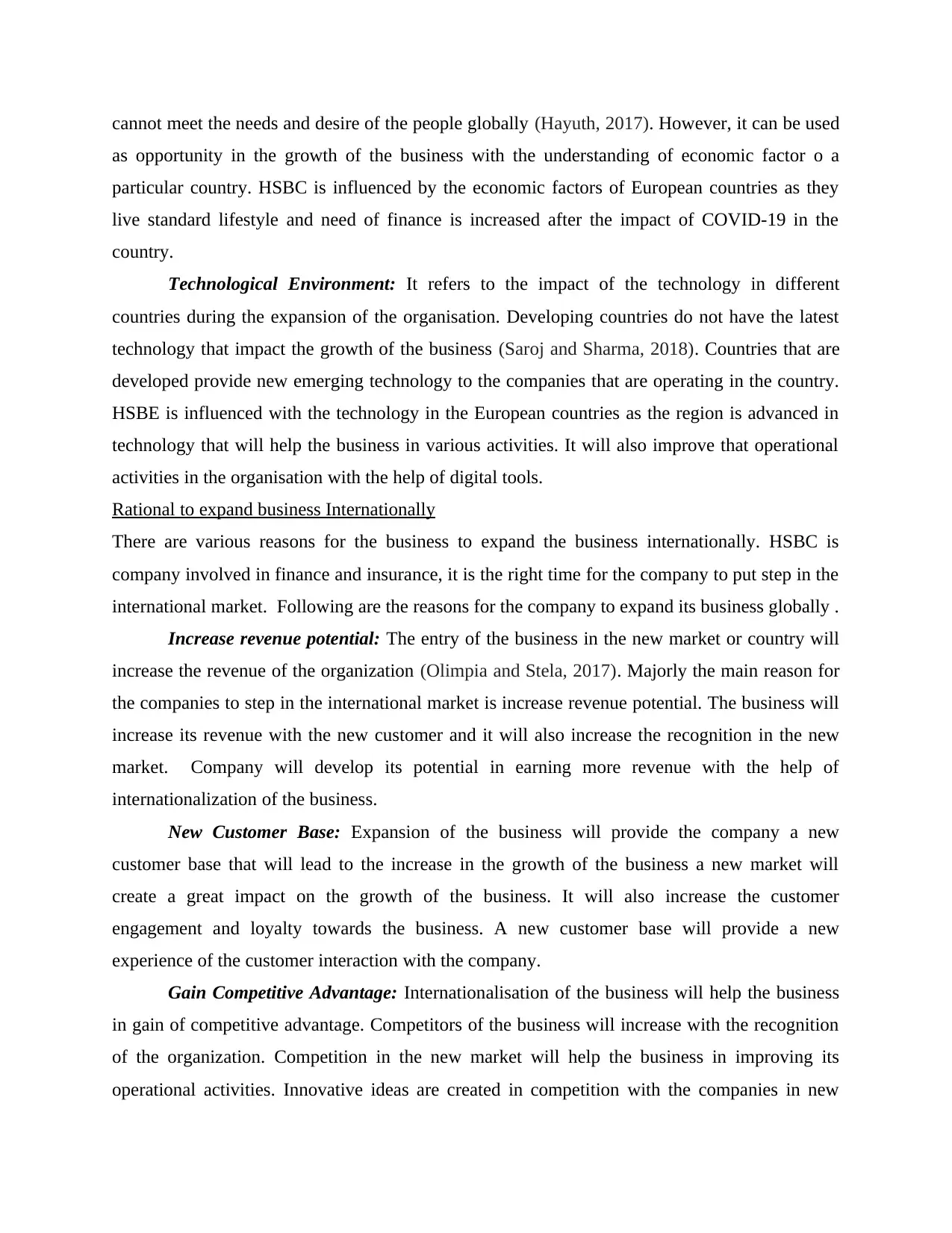
cannot meet the needs and desire of the people globally (Hayuth, 2017). However, it can be used
as opportunity in the growth of the business with the understanding of economic factor o a
particular country. HSBC is influenced by the economic factors of European countries as they
live standard lifestyle and need of finance is increased after the impact of COVID-19 in the
country.
Technological Environment: It refers to the impact of the technology in different
countries during the expansion of the organisation. Developing countries do not have the latest
technology that impact the growth of the business (Saroj and Sharma, 2018). Countries that are
developed provide new emerging technology to the companies that are operating in the country.
HSBE is influenced with the technology in the European countries as the region is advanced in
technology that will help the business in various activities. It will also improve that operational
activities in the organisation with the help of digital tools.
Rational to expand business Internationally
There are various reasons for the business to expand the business internationally. HSBC is
company involved in finance and insurance, it is the right time for the company to put step in the
international market. Following are the reasons for the company to expand its business globally .
Increase revenue potential: The entry of the business in the new market or country will
increase the revenue of the organization (Olimpia and Stela, 2017). Majorly the main reason for
the companies to step in the international market is increase revenue potential. The business will
increase its revenue with the new customer and it will also increase the recognition in the new
market. Company will develop its potential in earning more revenue with the help of
internationalization of the business.
New Customer Base: Expansion of the business will provide the company a new
customer base that will lead to the increase in the growth of the business a new market will
create a great impact on the growth of the business. It will also increase the customer
engagement and loyalty towards the business. A new customer base will provide a new
experience of the customer interaction with the company.
Gain Competitive Advantage: Internationalisation of the business will help the business
in gain of competitive advantage. Competitors of the business will increase with the recognition
of the organization. Competition in the new market will help the business in improving its
operational activities. Innovative ideas are created in competition with the companies in new
as opportunity in the growth of the business with the understanding of economic factor o a
particular country. HSBC is influenced by the economic factors of European countries as they
live standard lifestyle and need of finance is increased after the impact of COVID-19 in the
country.
Technological Environment: It refers to the impact of the technology in different
countries during the expansion of the organisation. Developing countries do not have the latest
technology that impact the growth of the business (Saroj and Sharma, 2018). Countries that are
developed provide new emerging technology to the companies that are operating in the country.
HSBE is influenced with the technology in the European countries as the region is advanced in
technology that will help the business in various activities. It will also improve that operational
activities in the organisation with the help of digital tools.
Rational to expand business Internationally
There are various reasons for the business to expand the business internationally. HSBC is
company involved in finance and insurance, it is the right time for the company to put step in the
international market. Following are the reasons for the company to expand its business globally .
Increase revenue potential: The entry of the business in the new market or country will
increase the revenue of the organization (Olimpia and Stela, 2017). Majorly the main reason for
the companies to step in the international market is increase revenue potential. The business will
increase its revenue with the new customer and it will also increase the recognition in the new
market. Company will develop its potential in earning more revenue with the help of
internationalization of the business.
New Customer Base: Expansion of the business will provide the company a new
customer base that will lead to the increase in the growth of the business a new market will
create a great impact on the growth of the business. It will also increase the customer
engagement and loyalty towards the business. A new customer base will provide a new
experience of the customer interaction with the company.
Gain Competitive Advantage: Internationalisation of the business will help the business
in gain of competitive advantage. Competitors of the business will increase with the recognition
of the organization. Competition in the new market will help the business in improving its
operational activities. Innovative ideas are created in competition with the companies in new
Paraphrase This Document
Need a fresh take? Get an instant paraphrase of this document with our AI Paraphraser
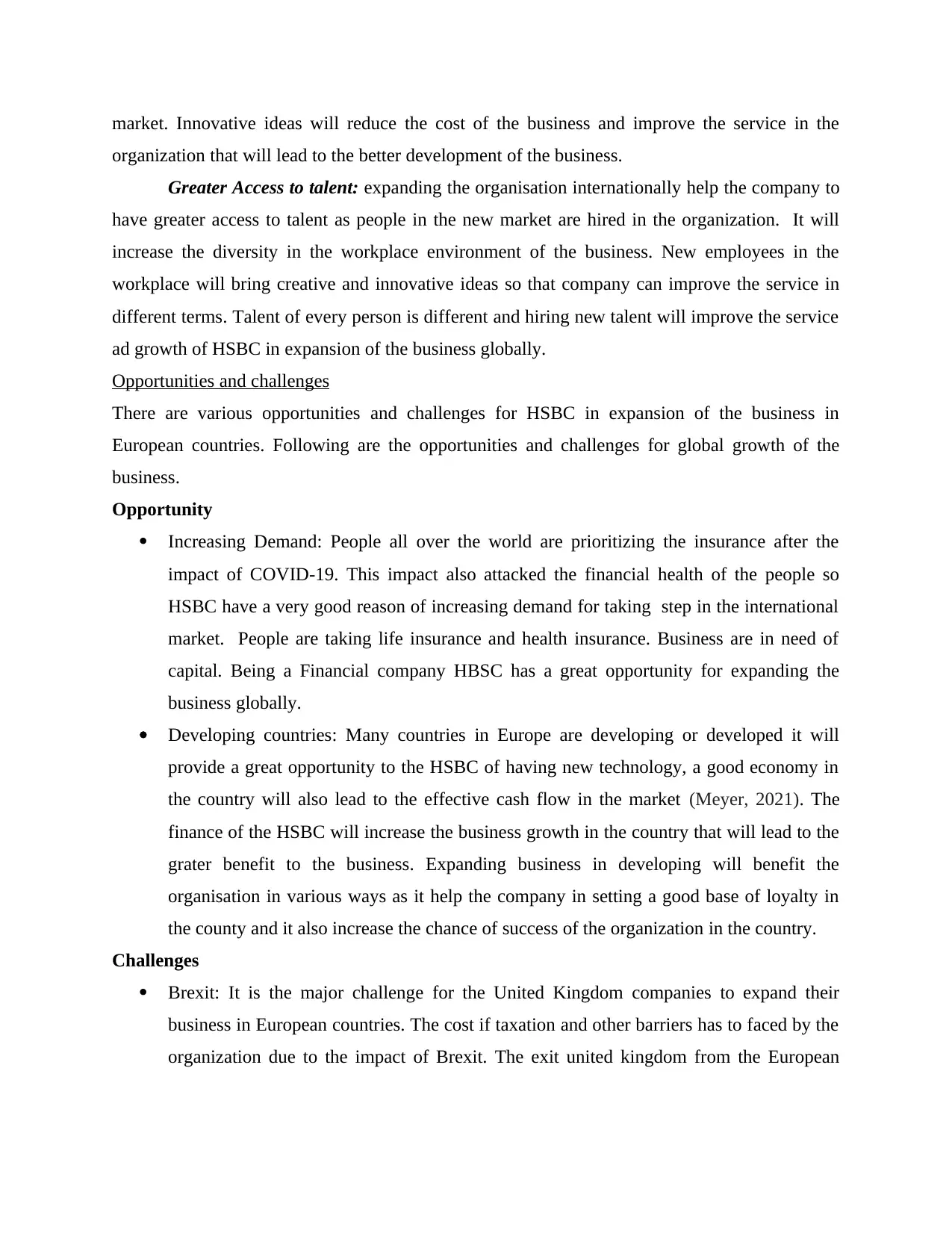
market. Innovative ideas will reduce the cost of the business and improve the service in the
organization that will lead to the better development of the business.
Greater Access to talent: expanding the organisation internationally help the company to
have greater access to talent as people in the new market are hired in the organization. It will
increase the diversity in the workplace environment of the business. New employees in the
workplace will bring creative and innovative ideas so that company can improve the service in
different terms. Talent of every person is different and hiring new talent will improve the service
ad growth of HSBC in expansion of the business globally.
Opportunities and challenges
There are various opportunities and challenges for HSBC in expansion of the business in
European countries. Following are the opportunities and challenges for global growth of the
business.
Opportunity
Increasing Demand: People all over the world are prioritizing the insurance after the
impact of COVID-19. This impact also attacked the financial health of the people so
HSBC have a very good reason of increasing demand for taking step in the international
market. People are taking life insurance and health insurance. Business are in need of
capital. Being a Financial company HBSC has a great opportunity for expanding the
business globally.
Developing countries: Many countries in Europe are developing or developed it will
provide a great opportunity to the HSBC of having new technology, a good economy in
the country will also lead to the effective cash flow in the market (Meyer, 2021). The
finance of the HSBC will increase the business growth in the country that will lead to the
grater benefit to the business. Expanding business in developing will benefit the
organisation in various ways as it help the company in setting a good base of loyalty in
the county and it also increase the chance of success of the organization in the country.
Challenges
Brexit: It is the major challenge for the United Kingdom companies to expand their
business in European countries. The cost if taxation and other barriers has to faced by the
organization due to the impact of Brexit. The exit united kingdom from the European
organization that will lead to the better development of the business.
Greater Access to talent: expanding the organisation internationally help the company to
have greater access to talent as people in the new market are hired in the organization. It will
increase the diversity in the workplace environment of the business. New employees in the
workplace will bring creative and innovative ideas so that company can improve the service in
different terms. Talent of every person is different and hiring new talent will improve the service
ad growth of HSBC in expansion of the business globally.
Opportunities and challenges
There are various opportunities and challenges for HSBC in expansion of the business in
European countries. Following are the opportunities and challenges for global growth of the
business.
Opportunity
Increasing Demand: People all over the world are prioritizing the insurance after the
impact of COVID-19. This impact also attacked the financial health of the people so
HSBC have a very good reason of increasing demand for taking step in the international
market. People are taking life insurance and health insurance. Business are in need of
capital. Being a Financial company HBSC has a great opportunity for expanding the
business globally.
Developing countries: Many countries in Europe are developing or developed it will
provide a great opportunity to the HSBC of having new technology, a good economy in
the country will also lead to the effective cash flow in the market (Meyer, 2021). The
finance of the HSBC will increase the business growth in the country that will lead to the
grater benefit to the business. Expanding business in developing will benefit the
organisation in various ways as it help the company in setting a good base of loyalty in
the county and it also increase the chance of success of the organization in the country.
Challenges
Brexit: It is the major challenge for the United Kingdom companies to expand their
business in European countries. The cost if taxation and other barriers has to faced by the
organization due to the impact of Brexit. The exit united kingdom from the European
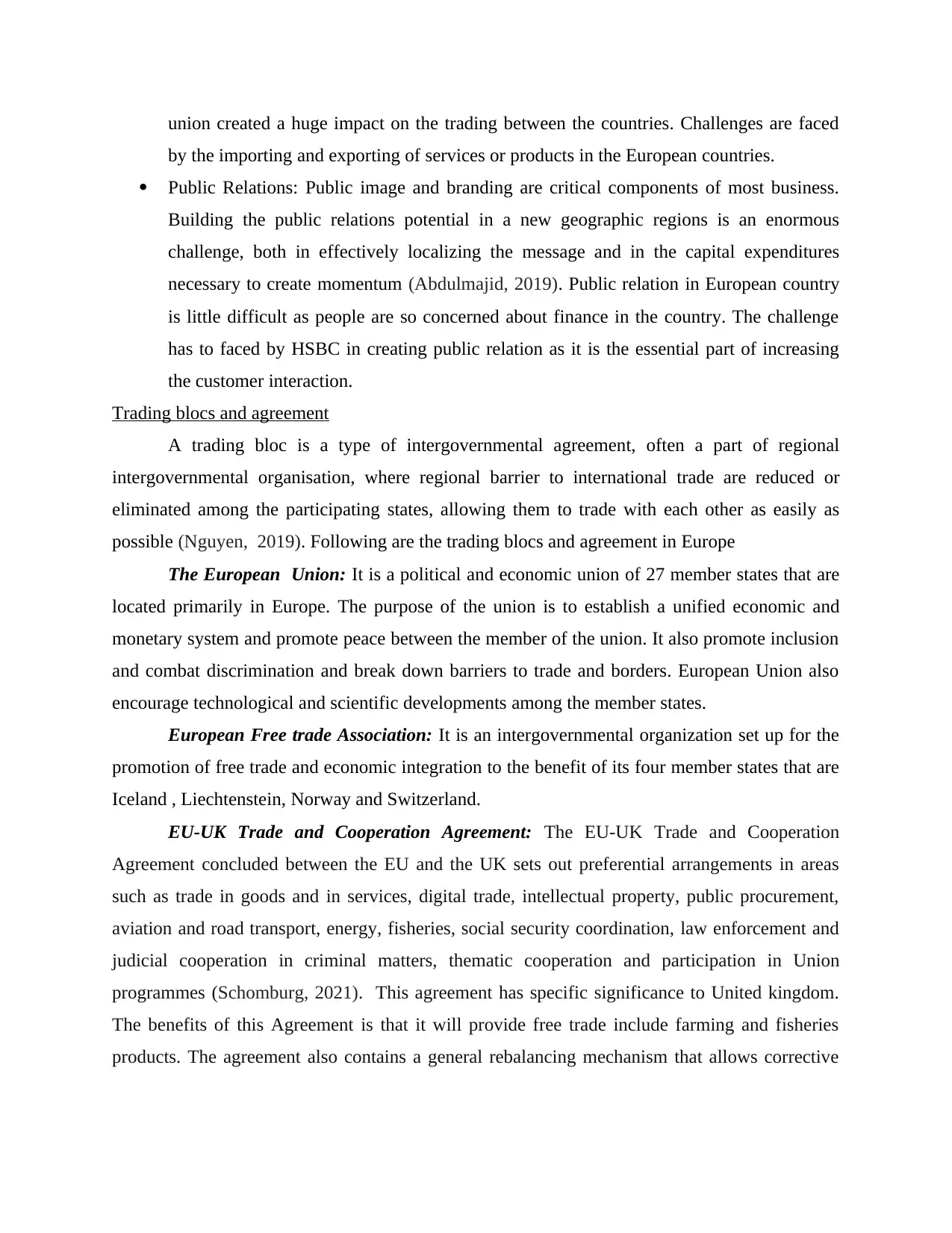
union created a huge impact on the trading between the countries. Challenges are faced
by the importing and exporting of services or products in the European countries.
Public Relations: Public image and branding are critical components of most business.
Building the public relations potential in a new geographic regions is an enormous
challenge, both in effectively localizing the message and in the capital expenditures
necessary to create momentum (Abdulmajid, 2019). Public relation in European country
is little difficult as people are so concerned about finance in the country. The challenge
has to faced by HSBC in creating public relation as it is the essential part of increasing
the customer interaction.
Trading blocs and agreement
A trading bloc is a type of intergovernmental agreement, often a part of regional
intergovernmental organisation, where regional barrier to international trade are reduced or
eliminated among the participating states, allowing them to trade with each other as easily as
possible (Nguyen, 2019). Following are the trading blocs and agreement in Europe
The European Union: It is a political and economic union of 27 member states that are
located primarily in Europe. The purpose of the union is to establish a unified economic and
monetary system and promote peace between the member of the union. It also promote inclusion
and combat discrimination and break down barriers to trade and borders. European Union also
encourage technological and scientific developments among the member states.
European Free trade Association: It is an intergovernmental organization set up for the
promotion of free trade and economic integration to the benefit of its four member states that are
Iceland , Liechtenstein, Norway and Switzerland.
EU-UK Trade and Cooperation Agreement: The EU-UK Trade and Cooperation
Agreement concluded between the EU and the UK sets out preferential arrangements in areas
such as trade in goods and in services, digital trade, intellectual property, public procurement,
aviation and road transport, energy, fisheries, social security coordination, law enforcement and
judicial cooperation in criminal matters, thematic cooperation and participation in Union
programmes (Schomburg, 2021). This agreement has specific significance to United kingdom.
The benefits of this Agreement is that it will provide free trade include farming and fisheries
products. The agreement also contains a general rebalancing mechanism that allows corrective
by the importing and exporting of services or products in the European countries.
Public Relations: Public image and branding are critical components of most business.
Building the public relations potential in a new geographic regions is an enormous
challenge, both in effectively localizing the message and in the capital expenditures
necessary to create momentum (Abdulmajid, 2019). Public relation in European country
is little difficult as people are so concerned about finance in the country. The challenge
has to faced by HSBC in creating public relation as it is the essential part of increasing
the customer interaction.
Trading blocs and agreement
A trading bloc is a type of intergovernmental agreement, often a part of regional
intergovernmental organisation, where regional barrier to international trade are reduced or
eliminated among the participating states, allowing them to trade with each other as easily as
possible (Nguyen, 2019). Following are the trading blocs and agreement in Europe
The European Union: It is a political and economic union of 27 member states that are
located primarily in Europe. The purpose of the union is to establish a unified economic and
monetary system and promote peace between the member of the union. It also promote inclusion
and combat discrimination and break down barriers to trade and borders. European Union also
encourage technological and scientific developments among the member states.
European Free trade Association: It is an intergovernmental organization set up for the
promotion of free trade and economic integration to the benefit of its four member states that are
Iceland , Liechtenstein, Norway and Switzerland.
EU-UK Trade and Cooperation Agreement: The EU-UK Trade and Cooperation
Agreement concluded between the EU and the UK sets out preferential arrangements in areas
such as trade in goods and in services, digital trade, intellectual property, public procurement,
aviation and road transport, energy, fisheries, social security coordination, law enforcement and
judicial cooperation in criminal matters, thematic cooperation and participation in Union
programmes (Schomburg, 2021). This agreement has specific significance to United kingdom.
The benefits of this Agreement is that it will provide free trade include farming and fisheries
products. The agreement also contains a general rebalancing mechanism that allows corrective
⊘ This is a preview!⊘
Do you want full access?
Subscribe today to unlock all pages.

Trusted by 1+ million students worldwide
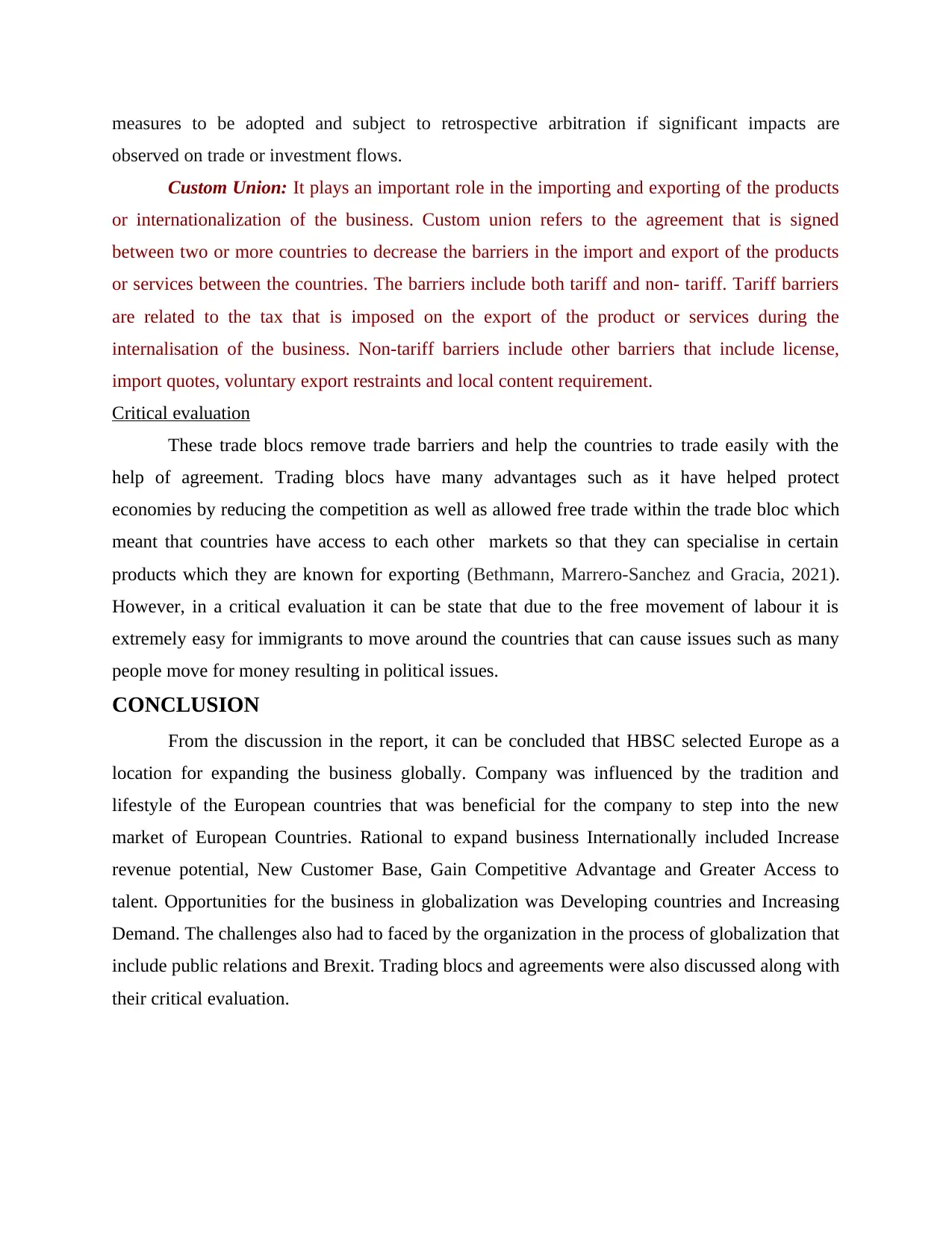
measures to be adopted and subject to retrospective arbitration if significant impacts are
observed on trade or investment flows.
Custom Union: It plays an important role in the importing and exporting of the products
or internationalization of the business. Custom union refers to the agreement that is signed
between two or more countries to decrease the barriers in the import and export of the products
or services between the countries. The barriers include both tariff and non- tariff. Tariff barriers
are related to the tax that is imposed on the export of the product or services during the
internalisation of the business. Non-tariff barriers include other barriers that include license,
import quotes, voluntary export restraints and local content requirement.
Critical evaluation
These trade blocs remove trade barriers and help the countries to trade easily with the
help of agreement. Trading blocs have many advantages such as it have helped protect
economies by reducing the competition as well as allowed free trade within the trade bloc which
meant that countries have access to each other markets so that they can specialise in certain
products which they are known for exporting (Bethmann, Marrero-Sanchez and Gracia, 2021).
However, in a critical evaluation it can be state that due to the free movement of labour it is
extremely easy for immigrants to move around the countries that can cause issues such as many
people move for money resulting in political issues.
CONCLUSION
From the discussion in the report, it can be concluded that HBSC selected Europe as a
location for expanding the business globally. Company was influenced by the tradition and
lifestyle of the European countries that was beneficial for the company to step into the new
market of European Countries. Rational to expand business Internationally included Increase
revenue potential, New Customer Base, Gain Competitive Advantage and Greater Access to
talent. Opportunities for the business in globalization was Developing countries and Increasing
Demand. The challenges also had to faced by the organization in the process of globalization that
include public relations and Brexit. Trading blocs and agreements were also discussed along with
their critical evaluation.
observed on trade or investment flows.
Custom Union: It plays an important role in the importing and exporting of the products
or internationalization of the business. Custom union refers to the agreement that is signed
between two or more countries to decrease the barriers in the import and export of the products
or services between the countries. The barriers include both tariff and non- tariff. Tariff barriers
are related to the tax that is imposed on the export of the product or services during the
internalisation of the business. Non-tariff barriers include other barriers that include license,
import quotes, voluntary export restraints and local content requirement.
Critical evaluation
These trade blocs remove trade barriers and help the countries to trade easily with the
help of agreement. Trading blocs have many advantages such as it have helped protect
economies by reducing the competition as well as allowed free trade within the trade bloc which
meant that countries have access to each other markets so that they can specialise in certain
products which they are known for exporting (Bethmann, Marrero-Sanchez and Gracia, 2021).
However, in a critical evaluation it can be state that due to the free movement of labour it is
extremely easy for immigrants to move around the countries that can cause issues such as many
people move for money resulting in political issues.
CONCLUSION
From the discussion in the report, it can be concluded that HBSC selected Europe as a
location for expanding the business globally. Company was influenced by the tradition and
lifestyle of the European countries that was beneficial for the company to step into the new
market of European Countries. Rational to expand business Internationally included Increase
revenue potential, New Customer Base, Gain Competitive Advantage and Greater Access to
talent. Opportunities for the business in globalization was Developing countries and Increasing
Demand. The challenges also had to faced by the organization in the process of globalization that
include public relations and Brexit. Trading blocs and agreements were also discussed along with
their critical evaluation.
Paraphrase This Document
Need a fresh take? Get an instant paraphrase of this document with our AI Paraphraser
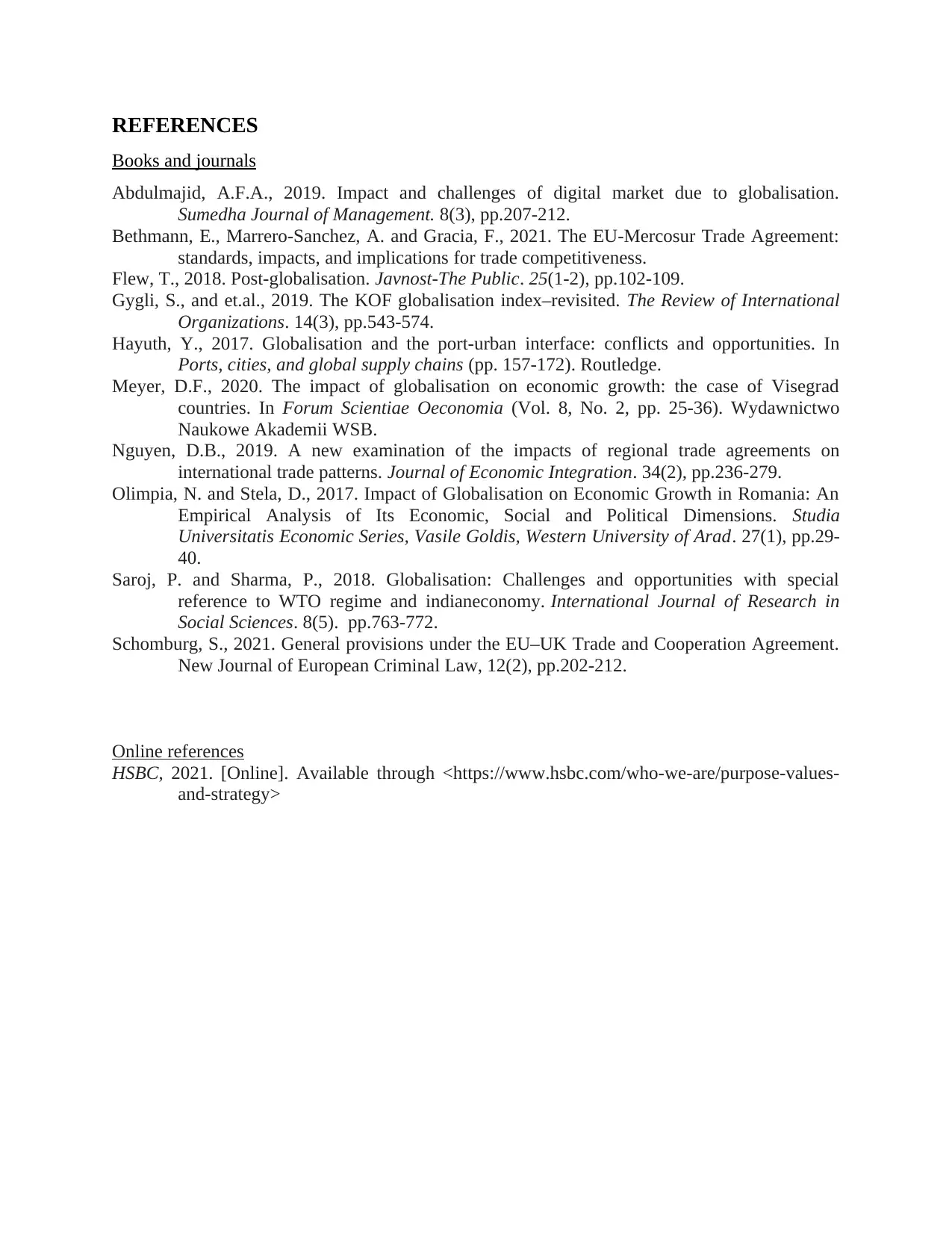
REFERENCES
Books and journals
Abdulmajid, A.F.A., 2019. Impact and challenges of digital market due to globalisation.
Sumedha Journal of Management. 8(3), pp.207-212.
Bethmann, E., Marrero-Sanchez, A. and Gracia, F., 2021. The EU-Mercosur Trade Agreement:
standards, impacts, and implications for trade competitiveness.
Flew, T., 2018. Post-globalisation. Javnost-The Public. 25(1-2), pp.102-109.
Gygli, S., and et.al., 2019. The KOF globalisation index–revisited. The Review of International
Organizations. 14(3), pp.543-574.
Hayuth, Y., 2017. Globalisation and the port-urban interface: conflicts and opportunities. In
Ports, cities, and global supply chains (pp. 157-172). Routledge.
Meyer, D.F., 2020. The impact of globalisation on economic growth: the case of Visegrad
countries. In Forum Scientiae Oeconomia (Vol. 8, No. 2, pp. 25-36). Wydawnictwo
Naukowe Akademii WSB.
Nguyen, D.B., 2019. A new examination of the impacts of regional trade agreements on
international trade patterns. Journal of Economic Integration. 34(2), pp.236-279.
Olimpia, N. and Stela, D., 2017. Impact of Globalisation on Economic Growth in Romania: An
Empirical Analysis of Its Economic, Social and Political Dimensions. Studia
Universitatis Economic Series, Vasile Goldis, Western University of Arad. 27(1), pp.29-
40.
Saroj, P. and Sharma, P., 2018. Globalisation: Challenges and opportunities with special
reference to WTO regime and indianeconomy. International Journal of Research in
Social Sciences. 8(5). pp.763-772.
Schomburg, S., 2021. General provisions under the EU–UK Trade and Cooperation Agreement.
New Journal of European Criminal Law, 12(2), pp.202-212.
Online references
HSBC, 2021. [Online]. Available through <https://www.hsbc.com/who-we-are/purpose-values-
and-strategy>
Books and journals
Abdulmajid, A.F.A., 2019. Impact and challenges of digital market due to globalisation.
Sumedha Journal of Management. 8(3), pp.207-212.
Bethmann, E., Marrero-Sanchez, A. and Gracia, F., 2021. The EU-Mercosur Trade Agreement:
standards, impacts, and implications for trade competitiveness.
Flew, T., 2018. Post-globalisation. Javnost-The Public. 25(1-2), pp.102-109.
Gygli, S., and et.al., 2019. The KOF globalisation index–revisited. The Review of International
Organizations. 14(3), pp.543-574.
Hayuth, Y., 2017. Globalisation and the port-urban interface: conflicts and opportunities. In
Ports, cities, and global supply chains (pp. 157-172). Routledge.
Meyer, D.F., 2020. The impact of globalisation on economic growth: the case of Visegrad
countries. In Forum Scientiae Oeconomia (Vol. 8, No. 2, pp. 25-36). Wydawnictwo
Naukowe Akademii WSB.
Nguyen, D.B., 2019. A new examination of the impacts of regional trade agreements on
international trade patterns. Journal of Economic Integration. 34(2), pp.236-279.
Olimpia, N. and Stela, D., 2017. Impact of Globalisation on Economic Growth in Romania: An
Empirical Analysis of Its Economic, Social and Political Dimensions. Studia
Universitatis Economic Series, Vasile Goldis, Western University of Arad. 27(1), pp.29-
40.
Saroj, P. and Sharma, P., 2018. Globalisation: Challenges and opportunities with special
reference to WTO regime and indianeconomy. International Journal of Research in
Social Sciences. 8(5). pp.763-772.
Schomburg, S., 2021. General provisions under the EU–UK Trade and Cooperation Agreement.
New Journal of European Criminal Law, 12(2), pp.202-212.
Online references
HSBC, 2021. [Online]. Available through <https://www.hsbc.com/who-we-are/purpose-values-
and-strategy>
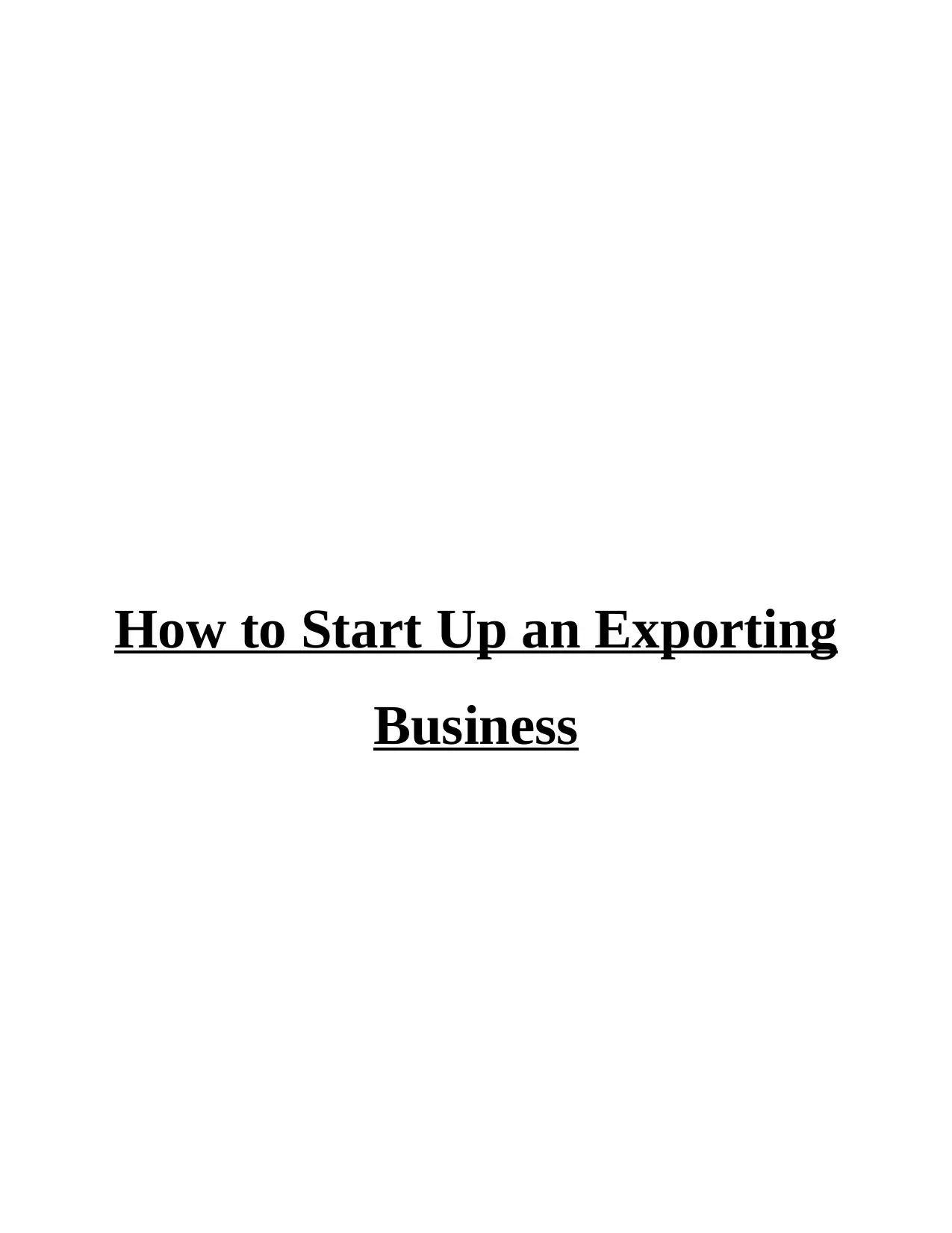
How to Start Up an Exporting
Business
Business
⊘ This is a preview!⊘
Do you want full access?
Subscribe today to unlock all pages.

Trusted by 1+ million students worldwide
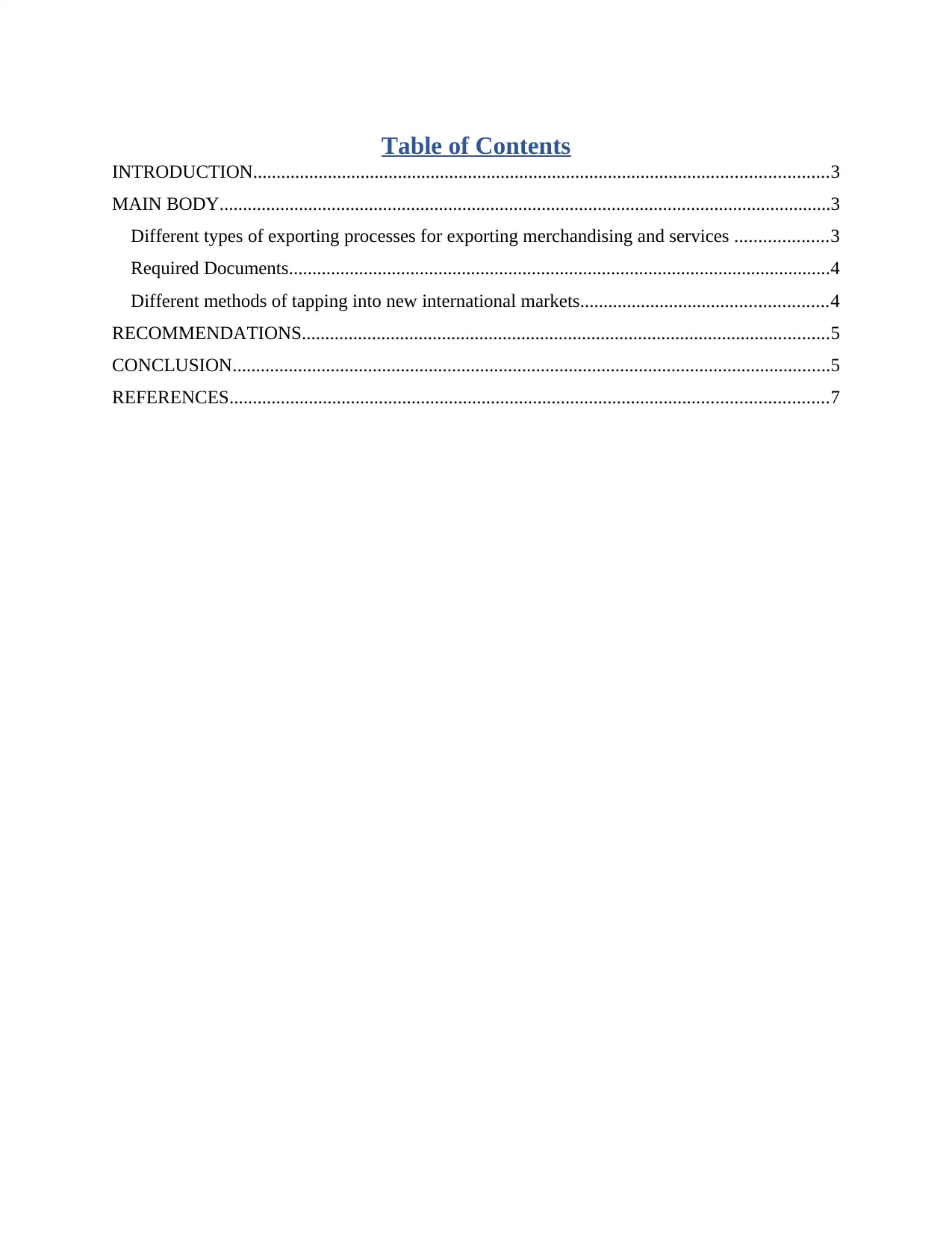
Table of Contents
INTRODUCTION...........................................................................................................................3
MAIN BODY...................................................................................................................................3
Different types of exporting processes for exporting merchandising and services ....................3
Required Documents....................................................................................................................4
Different methods of tapping into new international markets.....................................................4
RECOMMENDATIONS.................................................................................................................5
CONCLUSION................................................................................................................................5
REFERENCES................................................................................................................................7
INTRODUCTION...........................................................................................................................3
MAIN BODY...................................................................................................................................3
Different types of exporting processes for exporting merchandising and services ....................3
Required Documents....................................................................................................................4
Different methods of tapping into new international markets.....................................................4
RECOMMENDATIONS.................................................................................................................5
CONCLUSION................................................................................................................................5
REFERENCES................................................................................................................................7
Paraphrase This Document
Need a fresh take? Get an instant paraphrase of this document with our AI Paraphraser
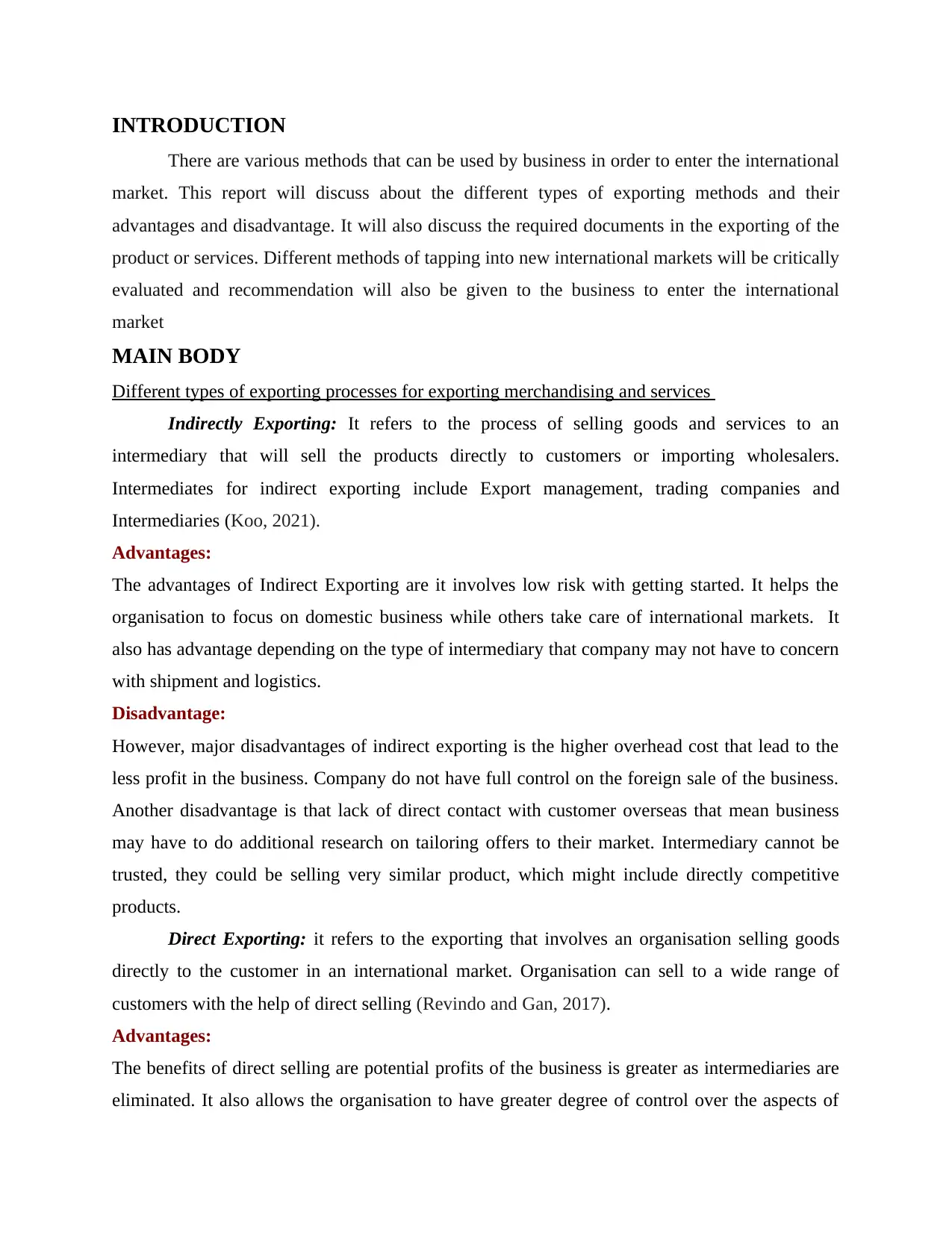
INTRODUCTION
There are various methods that can be used by business in order to enter the international
market. This report will discuss about the different types of exporting methods and their
advantages and disadvantage. It will also discuss the required documents in the exporting of the
product or services. Different methods of tapping into new international markets will be critically
evaluated and recommendation will also be given to the business to enter the international
market
MAIN BODY
Different types of exporting processes for exporting merchandising and services
Indirectly Exporting: It refers to the process of selling goods and services to an
intermediary that will sell the products directly to customers or importing wholesalers.
Intermediates for indirect exporting include Export management, trading companies and
Intermediaries (Koo, 2021).
Advantages:
The advantages of Indirect Exporting are it involves low risk with getting started. It helps the
organisation to focus on domestic business while others take care of international markets. It
also has advantage depending on the type of intermediary that company may not have to concern
with shipment and logistics.
Disadvantage:
However, major disadvantages of indirect exporting is the higher overhead cost that lead to the
less profit in the business. Company do not have full control on the foreign sale of the business.
Another disadvantage is that lack of direct contact with customer overseas that mean business
may have to do additional research on tailoring offers to their market. Intermediary cannot be
trusted, they could be selling very similar product, which might include directly competitive
products.
Direct Exporting: it refers to the exporting that involves an organisation selling goods
directly to the customer in an international market. Organisation can sell to a wide range of
customers with the help of direct selling (Revindo and Gan, 2017).
Advantages:
The benefits of direct selling are potential profits of the business is greater as intermediaries are
eliminated. It also allows the organisation to have greater degree of control over the aspects of
There are various methods that can be used by business in order to enter the international
market. This report will discuss about the different types of exporting methods and their
advantages and disadvantage. It will also discuss the required documents in the exporting of the
product or services. Different methods of tapping into new international markets will be critically
evaluated and recommendation will also be given to the business to enter the international
market
MAIN BODY
Different types of exporting processes for exporting merchandising and services
Indirectly Exporting: It refers to the process of selling goods and services to an
intermediary that will sell the products directly to customers or importing wholesalers.
Intermediates for indirect exporting include Export management, trading companies and
Intermediaries (Koo, 2021).
Advantages:
The advantages of Indirect Exporting are it involves low risk with getting started. It helps the
organisation to focus on domestic business while others take care of international markets. It
also has advantage depending on the type of intermediary that company may not have to concern
with shipment and logistics.
Disadvantage:
However, major disadvantages of indirect exporting is the higher overhead cost that lead to the
less profit in the business. Company do not have full control on the foreign sale of the business.
Another disadvantage is that lack of direct contact with customer overseas that mean business
may have to do additional research on tailoring offers to their market. Intermediary cannot be
trusted, they could be selling very similar product, which might include directly competitive
products.
Direct Exporting: it refers to the exporting that involves an organisation selling goods
directly to the customer in an international market. Organisation can sell to a wide range of
customers with the help of direct selling (Revindo and Gan, 2017).
Advantages:
The benefits of direct selling are potential profits of the business is greater as intermediaries are
eliminated. It also allows the organisation to have greater degree of control over the aspects of
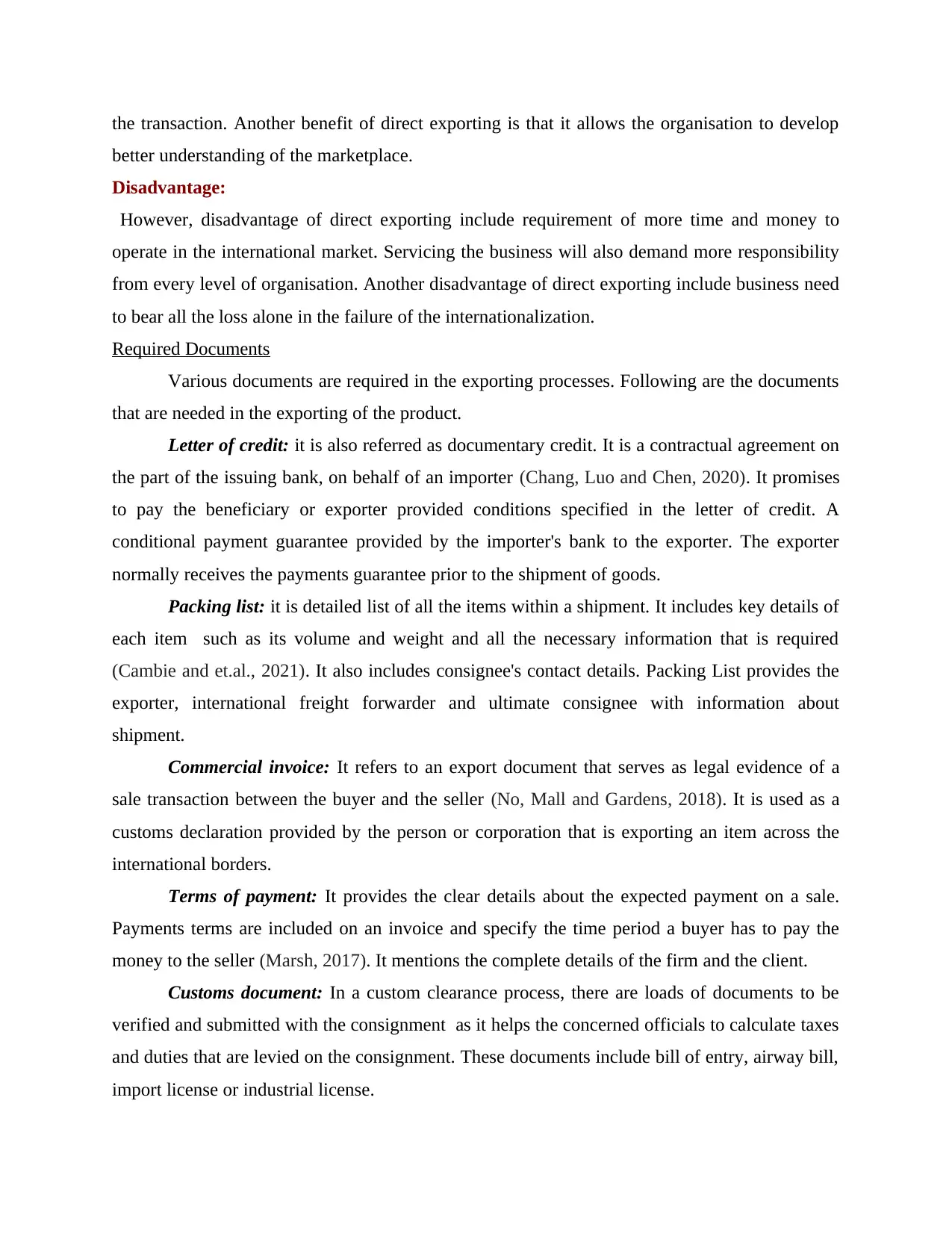
the transaction. Another benefit of direct exporting is that it allows the organisation to develop
better understanding of the marketplace.
Disadvantage:
However, disadvantage of direct exporting include requirement of more time and money to
operate in the international market. Servicing the business will also demand more responsibility
from every level of organisation. Another disadvantage of direct exporting include business need
to bear all the loss alone in the failure of the internationalization.
Required Documents
Various documents are required in the exporting processes. Following are the documents
that are needed in the exporting of the product.
Letter of credit: it is also referred as documentary credit. It is a contractual agreement on
the part of the issuing bank, on behalf of an importer (Chang, Luo and Chen, 2020). It promises
to pay the beneficiary or exporter provided conditions specified in the letter of credit. A
conditional payment guarantee provided by the importer's bank to the exporter. The exporter
normally receives the payments guarantee prior to the shipment of goods.
Packing list: it is detailed list of all the items within a shipment. It includes key details of
each item such as its volume and weight and all the necessary information that is required
(Cambie and et.al., 2021). It also includes consignee's contact details. Packing List provides the
exporter, international freight forwarder and ultimate consignee with information about
shipment.
Commercial invoice: It refers to an export document that serves as legal evidence of a
sale transaction between the buyer and the seller (No, Mall and Gardens, 2018). It is used as a
customs declaration provided by the person or corporation that is exporting an item across the
international borders.
Terms of payment: It provides the clear details about the expected payment on a sale.
Payments terms are included on an invoice and specify the time period a buyer has to pay the
money to the seller (Marsh, 2017). It mentions the complete details of the firm and the client.
Customs document: In a custom clearance process, there are loads of documents to be
verified and submitted with the consignment as it helps the concerned officials to calculate taxes
and duties that are levied on the consignment. These documents include bill of entry, airway bill,
import license or industrial license.
better understanding of the marketplace.
Disadvantage:
However, disadvantage of direct exporting include requirement of more time and money to
operate in the international market. Servicing the business will also demand more responsibility
from every level of organisation. Another disadvantage of direct exporting include business need
to bear all the loss alone in the failure of the internationalization.
Required Documents
Various documents are required in the exporting processes. Following are the documents
that are needed in the exporting of the product.
Letter of credit: it is also referred as documentary credit. It is a contractual agreement on
the part of the issuing bank, on behalf of an importer (Chang, Luo and Chen, 2020). It promises
to pay the beneficiary or exporter provided conditions specified in the letter of credit. A
conditional payment guarantee provided by the importer's bank to the exporter. The exporter
normally receives the payments guarantee prior to the shipment of goods.
Packing list: it is detailed list of all the items within a shipment. It includes key details of
each item such as its volume and weight and all the necessary information that is required
(Cambie and et.al., 2021). It also includes consignee's contact details. Packing List provides the
exporter, international freight forwarder and ultimate consignee with information about
shipment.
Commercial invoice: It refers to an export document that serves as legal evidence of a
sale transaction between the buyer and the seller (No, Mall and Gardens, 2018). It is used as a
customs declaration provided by the person or corporation that is exporting an item across the
international borders.
Terms of payment: It provides the clear details about the expected payment on a sale.
Payments terms are included on an invoice and specify the time period a buyer has to pay the
money to the seller (Marsh, 2017). It mentions the complete details of the firm and the client.
Customs document: In a custom clearance process, there are loads of documents to be
verified and submitted with the consignment as it helps the concerned officials to calculate taxes
and duties that are levied on the consignment. These documents include bill of entry, airway bill,
import license or industrial license.
⊘ This is a preview!⊘
Do you want full access?
Subscribe today to unlock all pages.

Trusted by 1+ million students worldwide
1 out of 16
Related Documents
Your All-in-One AI-Powered Toolkit for Academic Success.
+13062052269
info@desklib.com
Available 24*7 on WhatsApp / Email
![[object Object]](/_next/static/media/star-bottom.7253800d.svg)
Unlock your academic potential
Copyright © 2020–2026 A2Z Services. All Rights Reserved. Developed and managed by ZUCOL.



